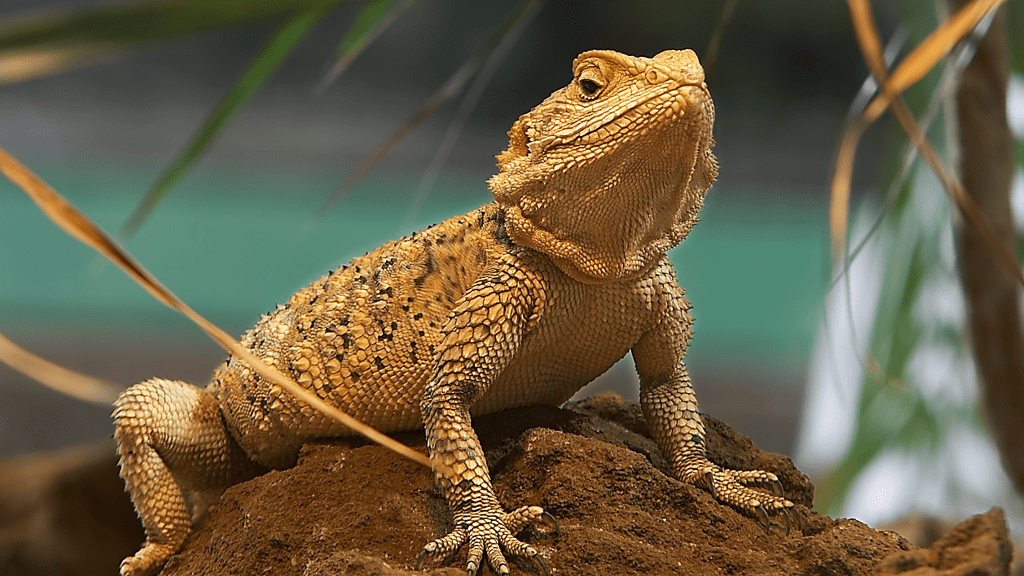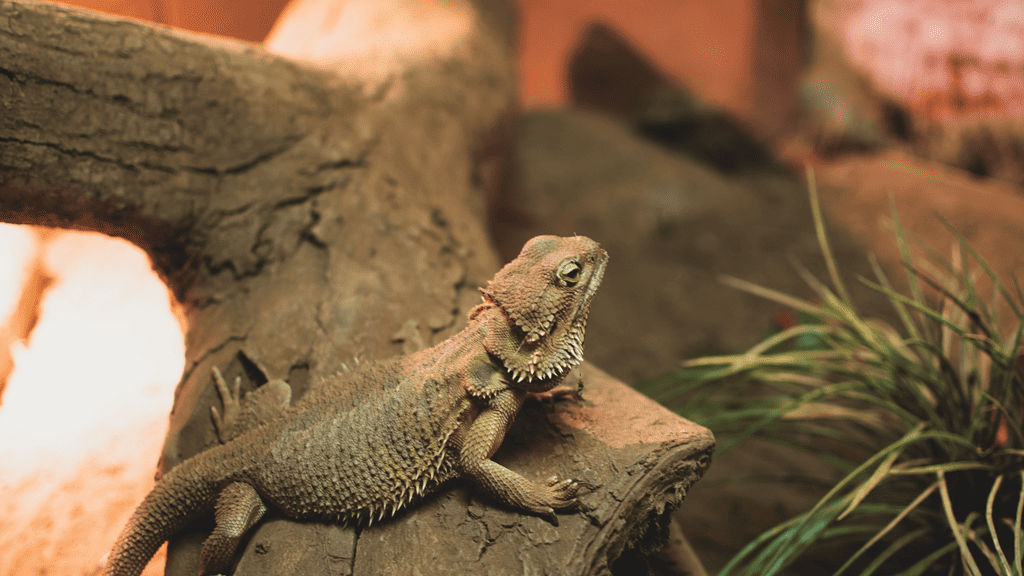Beardies are fantastic pets because they are friendly and easy to care for. They are a good choice for anyone who wants to get a lizard. Beardies are low-maintenance and inexpensive to house, with only a few basic needs. But as a new reptile owner, you must wonder, do bearded dragons pee?

Yes, Beardies pee like any other reptile. They pee in three distinct forms:
- Liquid urine
- Yellow urine
- White powdery urine
The dry, desert areas of Australia are the native habitat of bearded dragons. People who live in this severe, hot, and dry part of the world don’t have many chances to get the water they need to stay alive. That means bearded dragons have to get as much water as they can.
Bearded dragons can pee, but not in the sense that humans are accustomed to thinking of it. Instead of urinating in liquid form, they excrete uric acid, a solid material resembling chalky white powder. It’s possible that your bearded dragons won’t urinate for several days.
Whether it lives in the wild or is kept as a pet, the bearded dragon’s body is designed to keep as much hydration as possible.
How Do Bearded Dragons Pee?
The pee of bearded dragons varies from one specie to the other. For example, beardies indigenous to Australia’s deserts have bodies adapted to the country’s scorching temperatures. So, due to hot weather, their elimination process, including urination and defecation, is different from that of other subspecies. Inexperienced bearded dragon owners are often perplexed or alarmed by their pet’s inability to urinate in a traditional liquid form.
Liquid Urine
Bearded dragons are adapted to the desert’s harsh temperatures. So, even a small quantity of water expelled from the lizard’s body might create a water imbalance.
As a result, it may be quite upsetting to watch your beardies pee in liquid consistency. Remember that certain bearded dragons urinate in a liquid state, so you don’t need to be very concerned about this.
Eating a lot of veggies can also cause this; thus, a faecal test will be helpful in diagnosing the problem. However, there is also the possibility of an underlying cause; for this reason, it would be prudent to see your veterinary to acquire an expert opinion on the matter.
Yellow Urine
Bearded dragon pee can occasionally be a bit yellow, but this is normal and should not cause concern. However, if your reptile’s urine is consistently yellow, it may indicate that they are not getting enough water.
Yellowing, on the other hand, may also indicate that your reptile is getting an excessive amount of calcium in its food. The most important thing to do is to examine the food you provide to your pet and check to see that it does not include excessive calcium. If this is the case, you should switch to a diet with less calcium.
White Powdery Urine
Some beardies have liquid pee (as discussed above), but the pee of the typical pet dragon is a white powder commonly known as urate.
If you see that your beardie is urinating a white powdery substance. This is perfectly typical behaviour for bearded dragons.

Bearded Dragon Dehydration Symptoms
When you realize that your bearded dragon only has to urinate once or twice a week, you’ll feel much better. The most serious health risk is dehydration, which is not caused by a lack of urine in and of itself; instead, the problem is that there is not enough urine. But that doesn’t mean your bearded dragon can’t become dehydrated.
Some of the warning signs of dehydration include the following:
- Sunken eyes
- Lethargy
- Wrinkles skin
- Consistent yellow pee
- Sudden lack of appetite
- Harder pee than usual
When a bearded dragon is sick or injured, it is extremely critical to take immediate action if he is dehydrated. A sick bearded dragon can have trouble swallowing water or be unable to do so at all. This results in severe dehydration, which, if left untreated, can be deadly.
You may assist your bearded dragon in getting back on track with his hydration by adding additional water to his tank or feeding him water using an eye dropper or needle-free syringe. These options will provide your bearded dragon with adequate hydration.
You may also speed up the process of hydrating your bearded dragon by giving it a warm bath. In addition, you may moisten your bearded dragon’s snout with water.
How Often Can a Bearded Dragon Pee?
The bearded dragon doesn’t pee very often. This is probably because their elimination system operates so that it tries to retain as much moisture as possible to prevent dehydration.
The following are some of the behaviours that a bearded dragon owner might observe from their pet:
- Bearded dragons younger than four months old normally pee between one and three times daily.
- Bearded dragons a little bit older, or “teens,” often only pee once per day between the ages of 4 and 18 months.
- Bearded dragons that have reached adulthood will only defecate two to four times in a single week.
It is safe to say that the fact that you only see your bearded dragon pee once per week is nothing to worry about. Additionally, it is usual for an adult bearded dragon to defecate regularly.
Remember that every bearded dragon is unique. Even while age is the most essential component in determining urine frequency, it is not the only variable that impacts the length of time between voiding. The frequency of your bearded dragon’s peeing can be affected by various factors, including its nutrition, stress level, and the level of heat and light in its environment. For example, if there is an excessive amount of heat inside the enclosure, this might result in an excessive amount of moisture evaporation.
Does Stress Affect the Urination of Bearded Dragons?
Stress may also affect the peeing habit or shedding of the beardies. Bearded dragons are susceptible to experiencing stress due to a wide variety of circumstances.
Even a slight shift in the environment in which they live might potentially cause them to worry. Bearded dragons will, in most situations, need some adjustment time to adjust to their new living arrangements.
Temperatures that are either too low or too high can be stressful. It’s of the utmost importance to keep a close eye on the temperature of the habitat in order to prevent any health problems from occurring to the bearded dragons.
Noise is another potential source of stress for bearded dragons. Therefore, ensure that there is as little noise as possible so that your bearded dragons may continue to feel comfortable in their home.
Does Bearded Dragon Urine Consistency Matter?
In addition to the color of the urine, you should pay attention to the consistency of the urine as well. The healthy and typical urine consistency is that it is light. If the urine of your bearded dragon is thick, this might be another indication that they are becoming dehydrated.
You might try giving your bearded dragons a warm bath if the problem still persists. This will assist them in rehydrating themselves. Carry out this task regularly or as required to help your bearded dragons regain the appropriate hydration level.
